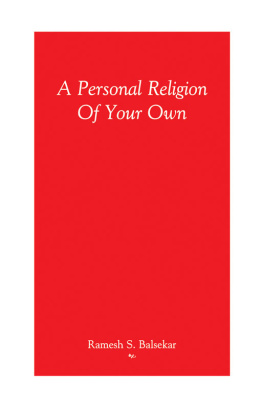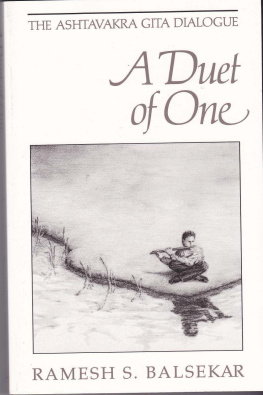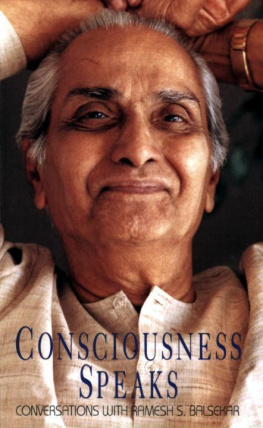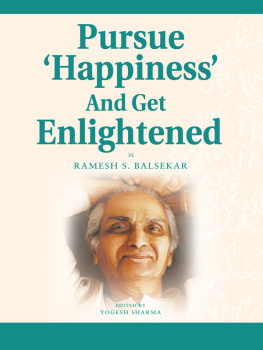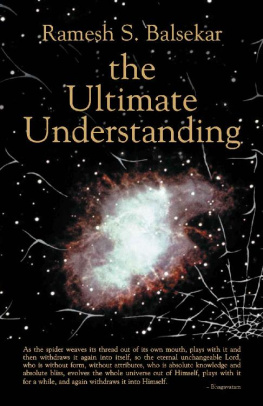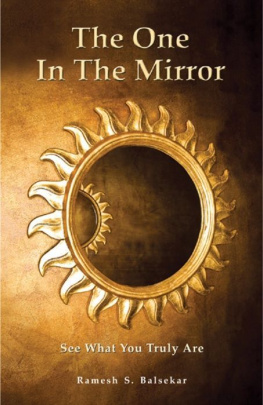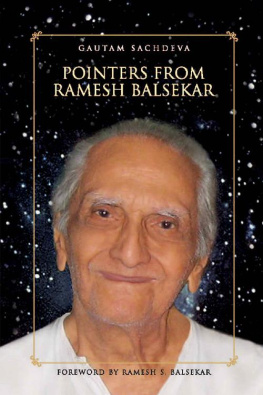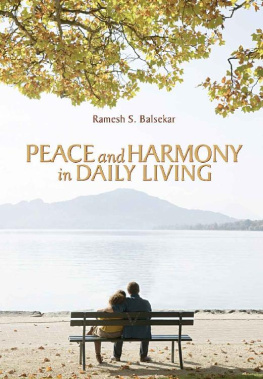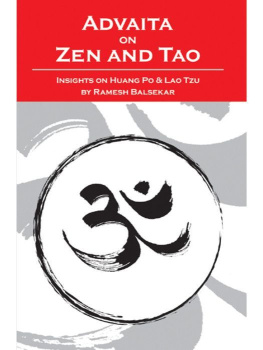
A
Personal Religion
Of Your Own
Ramesh S. Balsekar

Books by Ramesh S. Balsekar
Does The Human Being Have Free (2007)
Enlightened Living (2007)
A Buddhas Babble (2006)
The Essence of The Ashtavakra (2006)
The Relationship Between I And Me (2006)
A Homage To The Unique Teaching (2006)
Seeking Enlightenment Why ? (2005)
Nuggets of Wisdom (2005)
The End of The Seeking (2005)
Spiritual Search Step By Step (2004)
The Third Force Cosmic Law (2005)
Confusion No More (2003)
Guru Pournima (2003)
Upadesa Saram (2001)
Advaita, the Buddha and the Unbroken Whole (2000)
It So Happened That The Unique Teaching of Ramesh S. Balsekar (2000)
Sin and Guilt: Monstrosity of Mind (2000)
Meaningful Trivialities from the Source (2000)
The Infamous Ego (1999)
Who Cares?! (1999)
The Essence of the Bhagavad Gita (1999)
Your Head in the Tigers Mouth (1997)
Consciousness Writes (1996)
Consciousness Speaks (1996)
The Bhagavad Gita A Selection (1995)
Ripples (1994)
Consciousness Strikes (1994)
A Personal Religion Of Your Own
Ramesh S. Balsekar
Copyright Ramesh S. Balsekar 2006
PUBLISHED BY
ZEN PUBLICATIONS at Smashwords
60, Juhu Supreme Shopping Centre,
Gulmohar Cross Road No. 9, JVPD Scheme,
Juhu, Mumbai 400 049. India.
Tel: +91 22 32408074
eMail:
Website: www.zenpublications.com

I N T R O D U C T I O N
D aily living means every human being at any given time or place, even 5,000 years ago, doing in any situation, whatever he felt he should do. In other words, daily living cannot happen unless every human being has total free will.
Thereafter, what happens has never been in anyones control. What has happened is one of three things: 1) he has got what he wanted, 2) he has not got what he wanted; or, 3) what happened was beyond his expectation, for better or worse. Thereafter, the society has accepted what has happened, as the individuals action, judged it as good or bad, and given its award according to social regulations and legal provisions: reward or punishment. Reward has meant pleasure in the moment; punishment has meant pain in the moment.
That is what daily living means. It must begin with free will for the human being, but there after it is Gods Will. And the human beings free will is based on two factors genes, and conditioning in the social environment in which the individual was born, over neither of which did the individual have any control. Both factors were created by God. Therefore, it is perfectly clear that whatever any individual has done is precisely what God expected him to do; how can he ever commit a sin ?
It is absolutely clear, therefore, that whatever the human being does is precisely what God expected him to do, and to accept the consequences also pleasure in the moment or pain in the moment. At any moment; whatever situation a human being finds himself in, is precisely what is supposed to happen according to his destiny, Gods Will/Cosmic Law.
The human being is thus merely an instrument through which God functions according to the Cosmic Law, the basis of which the human brain is incapable of understanding: it is too vast and too complex.
It is absolutely clear, therefore, that the human being is not the doer of any deed neither himself nor the other. Whatever happens, the human being has to accept as Gods Will; and since he is not the doer of any deed, he does not have to carry, at any time, the load of sin and guilt about his own actions, nor the load of hatred for the others who have hurt him The absence of these two loads means peace of mind the happiness which every human being seeks in life.

C O N V E R S A T I O N W I T H R A M E S H
June 25, 2006
RAMESH: So, who is going to start? Your name is?
SUHAS: I am Suhas and this is Kalpana. I have come here for the first time. I was guided by Vipul.
RAMESH: I see.
SUHAS: I wanted to ask a simple thing. Is it necessary for a human being, who wants to lead a happy and disciplined life to follow a religion?
RAMESH: No! What do you mean by religion?
SUHAS: That was my second question. What is the meaning of religion? What is the meaning of spirituality and dhamma?
[ R E L I G I O N
The basic principle of every religion happens to be the same.
The Bible says: Thy will be done.
The Hindu scriptures say:
a) Twam eva karta, Twam eva bhokta (Thou art the doer; Thou art the experiencer)
b) Twameva shrota, Twam eva vakta (Thou art the listener; Thou art the speaker)
The Muslim religion says: LA ILLAHAIL ALLAHU (There is no Reality but God, there is only God)
And yet there have been religious wars over hundreds of years. It cannot be denied that whatever has happened wars, natural disasters, epidemics or whatever could not have happened unless it was Gods Will. But the apparent cause of conflict between religions is that the basic principle common to all religions, so direct and simple that it needs no interpretation, has been interpreted by successive generations of interpreters (by whatever name and authority designated) in such a way that each religion has its own dogmas, mainly concerned with behaviour in daily living. And it is these interpretations, or rather, misinterpretations and appurtenances that are the cause of dissension among the followers of various religions: rites and rituals based on concepts of Dos and Donts which have no foundation.
If an individual does not follow the prescribed religions rites and rituals, he is supposed to commit a sin which is deemed to have various horrible consequences in this life and beyond. And, unfortunately, in the various daily routines, the basic principle of Gods Will is totally forgotten.
Religion and Sin go together, whatever the religion. The dictionary definition of sin is a transgression against divine law or principles of morality; offences against good taste, propriety, etc. This is obviously a necessarily vague description because the basis of sin varies from time to time, from culture to culture. The dictionary further enumerates seven deadly sins like pride, envy, lechery, anger, covetousness, gluttony and sloth. On this basis, one can only wonder if there could be any person, including a religious person like a priest, who is not continuously committing some sin or the other, all the time.
An interesting aspect of sin is food. The non-vegetarian human being in the West would consider killing an animal for food his natural right whilst a vegetarian in the East would consider it a deadly sin. It is interesting to note that a Brahmin in the West Coast of India would consider it perfectly natural to eat fish, the vegetable from the ocean, whilst it would be a sin to eat eggs or animal flesh; on the other hand, the Brahmin in Kashmir, an area in India with a very cold climate, would consider it perfectly correct to eat goat flesh, but eating even eggs would be a sin!
It is obvious that a group of influential people of the time decide what constitutes a sin, depending upon the circumstances of the time. Thus, until a few years ago, abortion was considered as a sin and a crime in almost every country and community in the world, and yet, today, almost every developing country sponsors abortion, with clinics where women can have abortions without having to pay anything.
Next page
